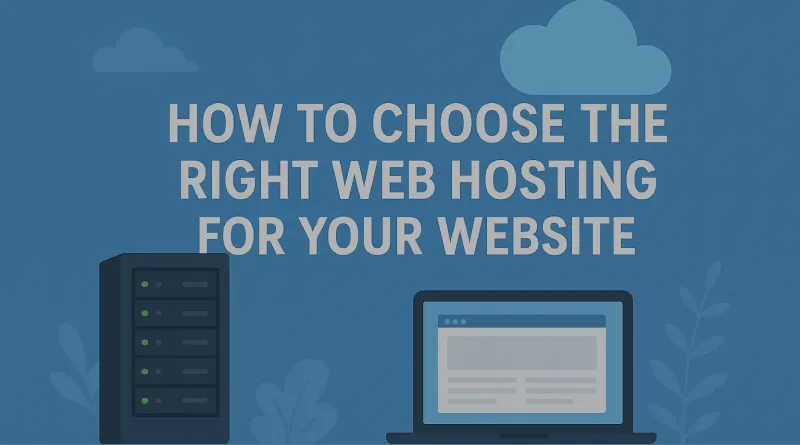How to Choose the Right Web Hosting for Your Website
When you decide to create a website—whether it’s for your business, personal blog, or online store—the first big step is selecting the right web hosting. Think of web hosting as the foundation of your online presence. A good host ensures your website runs smoothly, loads quickly, and stays secure. A poor choice, however, can lead to downtime, slow performance, and frustrated visitors. Here’s a clear guide to help you choose web hosting that fits your needs.
1. Understand Your Website’s Needs
Before looking at plans, consider what type of website you’re building. A small personal blog with a few visitors daily will have very different hosting requirements compared to an e-commerce store with thousands of monthly visitors. Ask yourself:
- Do I need basic hosting for a simple site?
- Will I require advanced features like e-commerce, databases, or custom applications?
- How much traffic do I expect?
Answering these questions will help you choose the right hosting type. Many businesses in Mumbai consult a Website Design Company in Mumbai to assess their hosting needs and ensure seamless performance.

2. Know the Different Types of Hosting
Web hosting comes in several forms, each with pros and cons:
- Shared Hosting - Affordable and beginner-friendly. Your site shares a server with others, which is fine for small websites but may slow down if traffic spikes.
- VPS Hosting - Offers more control and resources than shared hosting. Great for growing websites.
- Dedicated Hosting - You get an entire server to yourself. Ideal for high-traffic websites needing maximum speed and security.
- Cloud Hosting - Highly scalable and reliable. Your site is hosted across multiple servers, reducing downtime.
Choosing the right type depends on your budget and how demanding your website will be.
3. Check Reliability and Uptime
One of the most important factors is uptime—the amount of time your website stays online. Look for a hosting provider that guarantees at least 99.9% uptime. Even a small amount of downtime can mean lost visitors and sales.
4. Evaluate Speed and Performance
Website speed plays a major role in user experience and search engine rankings. Choose a hosting service that offers fast servers, SSD storage, and Content Delivery Network (CDN) options. The closer the server is to your target audience, the faster your site will load.
5. Security Features
Security is critical, especially if you’re handling sensitive data or online payments. Look for hosting that includes:
- Free SSL certificates
- Malware scanning and protection
- Automatic backups
- Secure data centers
These features help protect both your website and your visitors.
6. Customer Support Matters
Technical issues can arise at any time, so it’s essential to have reliable customer support. Go for providers offering 24/7 support via chat, phone, or email. Reading reviews about customer service can give you insights into how responsive and helpful a provider really is.
7. Scalability and Pricing
Start with a plan that suits your current needs, but make sure the host allows easy upgrades as your website grows. Many beginners choose shared hosting and later switch to VPS or cloud hosting as traffic increases. Also, check renewal prices, as many hosts offer low introductory rates that rise significantly after the first term.
Final Thoughts
Choosing the right web hosting isn’t just about picking the cheapest plan—it’s about finding a reliable, secure, and scalable solution that matches your website’s goals. Consulting a Website Design Company in Mumbai can make this process easier and help you select hosting that supports long-term growth. The right decision now will save you time, money, and headaches in the long run.
Disclaimer
The information presented in this blog is derived from publicly available sources for general use, including any cited references. While we strive to mention credible sources whenever possible, Website Design Company in Mumbai does not guarantee the accuracy of the information provided in any way. This article is intended solely for general informational purposes. It should be understood that it does not constitute legal advice and does not aim to serve as such. If any individual(s) make decisions based on the information in this article without verifying the facts, we explicitly reject any liability that may arise as a result. We recommend that readers seek separate guidance regarding any specific information provided here.

